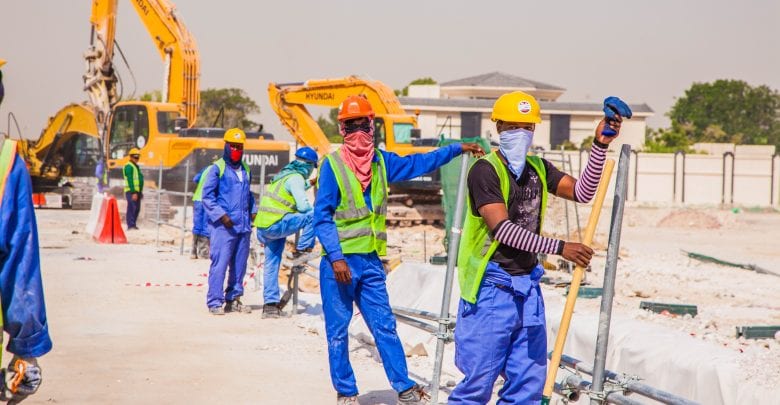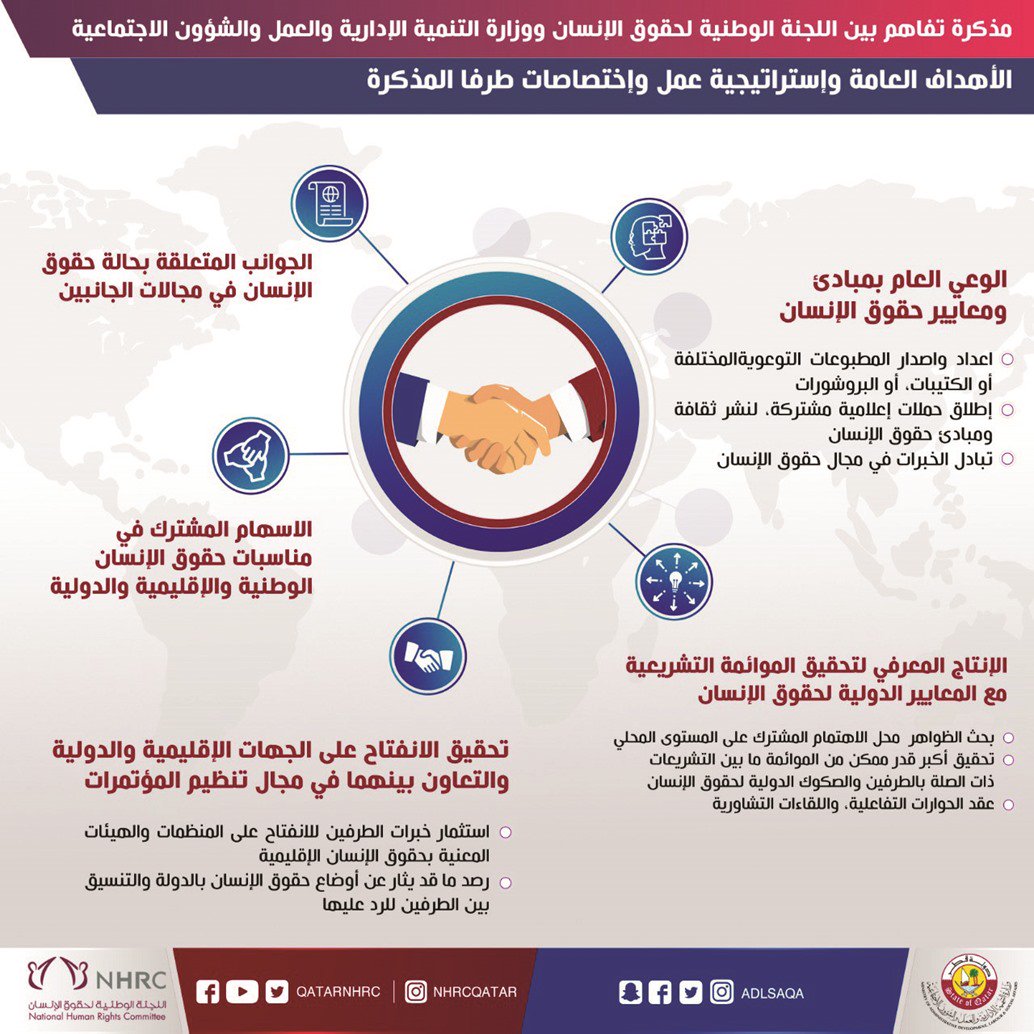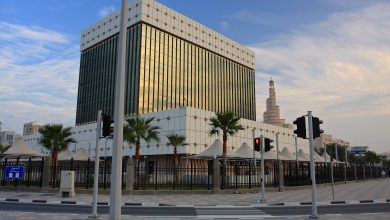
NHRC, labour ministry sign MoU to promote human rights
«الوطنية لحقوق الإنسان» و«التنمية» توقّعان مذكرة تفاهم عن «العمالة»
QNA/Doha
The National Human Rights Committee (NHRC) and the Ministry of Administrative Development, Labour and Social Affairs signed a memorandum of understanding (MoU) to co-operate and exchange expertise with regard to the affairs of expatriate workers and improve their sponsorship in Qatar.
The MoU seeks to ensure the establishment of a mechanism for co-operation in a manner that promotes co-ordination between both parties according to Qatar National Vision 2030 and the National Strategy of the State 2017-2022.
The MoU was signed by NHRC Secretary General Maryam bint Abdullah al-Attiyah and Assistant Undersecretary for Labour Affairs at the ministry Mohamed Hassan al-Obaidli.
The MoU recognises the importance of co-operation between the two parties, contributes to the dissemination and promotion of a culture of human rights and protecting these rights because of the common roles and tasks at the legal, monitoring, awareness and service levels related to human rights.
The MoU emphasises that the two parties would co-operate in a manner consistent with the general objectives and work strategy and competencies of each of them in the field of public awareness of human rights principles and standards.
The areas of co-operation include the field of knowledge production to achieve legislative harmonisation with international human rights standards in order to achieve openness to regional and international actors and co-operation in international and regional conferences and to contribute jointly to national, regional and international human rights events.
In addition to aspects relating to the human rights situation in areas related to the work of the two sides.
The MoU also includes co-operation in the development of public awareness of human rights principles and standards in the preparation and issuance of manuals and brochures and joint media campaigns on issues of common concern with a view to disseminating the culture and principles of human rights and exchanging experiences through workshops, conferences, seminars, and training programs held by each of the parties.
The two sides stressed the importance of co-operation in the field of knowledge production and agreed on an agenda to discuss the phenomena and problems of common interest that can be monitored in the local context or in the relevant UN resolutions through analytical descriptive studies, field studies, work, interactive dialogues and to invest the programmes established by the parties and seek to develop them to the extent possible to achieve this purpose.
The MOU also called for action to achieve legislative harmonisation with international human rights standards and to seek the greatest possible harmonisation of legislation relevant to the parties and international human rights instruments.
In addition to discussing problematic issues in the monitoring and following-up of treaty and non-treaty international bodies and committees on the implementation of international conventions on human rights ratified or acceded to by Qatar, as well as interactive dialogues and consultative meetings aimed at establishing common understanding between the parties.
The co-operation between the two sides through the MoU also includes opening up to regional and international bodies and investing the experiences of the two parties to open up to the organisations and bodies concerned with regional and international human rights (governmental and non-governmental) to achieve the common goals of the two parties, as well as monitor what may be raised about the human rights situation in the country, and co-ordinate between both parties with regards to response.
The MoU also includes aspects of co-operation in the field of international and regional conferences and the development of a plan to implement the recommendations of the international conferences held in Qatar on issues of mutual interest and related human rights and joint conferences held between national committees and human rights institutions.
It also aims at co-operation on national, regional and international human rights events and holding scientific events, cultural weeks, workshops, and wall posters.
وقعت اللجنة الوطنية لحقوق الإنسان ووزارة التنمية الإدارية والعمل والشؤون الاجتماعية، مذكرة تفاهم، أمس، للتعاون وتبادل الخبرات فيما يتعلق بشؤون العمالة الوافدة وتحسين رعايتها في دولة قطر بما يحقق المصلحة العامة، وبما يكفل وضع آلية للتعاون المشترك على نحو يعزز التنسيق بينهما وفق رؤية قطر الوطنية لعام 2030، والاستراتيجية الوطنية للدولة 2017-2022.
وقع على المذكرة السيد محمد حسن العبيدلي وكيل الوزارة المساعد لشؤون العمل بوزارة التنمية الإدارية والعمل والشؤون الاجتماعية، والسيدة مريم بنت عبدالله العطية الأمين العام للجنة الوطنية لحقوق الإنسان.
وجاءت مذكرة التفاهم إدراكاً من الطرفين بأهمية التعاون بينهما، بما يساهم في نشر ثقافة حقوق الإنسان وتعزيزها، وحماية هذه الحقوق، لما يجمع بينهما من أدوار ومهام مشتركة، على الصعد القانونية، والرقابية، والتوعوية، والخدمية المتعلقة بحقوق الإنسان، وواقع الشراكة الفعلية القائمة ما بين الطرفين.
وأكدت المذكرة على أن يتعاون الطرفان على نحو ينسجم مع الأهداف العامة واستراتيجية عمل واختصاصات كل منهما في مجال الوعي العام بمبادئ ومعايير حقوق الإنسان، وتشمل أوجه التعاون مجال الإنتاج المعرفي لتحقيق المواءمة التشريعية مع المعايير الدولية لحقوق الإنسان، وذلك لتحقيق الانفتاح على الجهات الإقليمية والدولية والتعاون بينهما في مجال المؤتمرات الدولية والإقليمية، والمساهمة المشتركة في مناسبات حقوق الإنسان الوطنية والإقليمية والدولية، بالإضافة إلى الجوانب المتعلقة بحالة حقوق الإنسان في المجالات التي تتعلق بعمل الطرفين.
كما تضمنت المذكرة التعاون في تنمية الوعي العام بمبادئ ومعايير حقوق الإنسان فيما يتعلق بإعداد وإصدار الأدلة التوجيهية، أو الكتيبات، أو البروشورات، وما يماثلها وإطلاق حملات إعلامية مشتركة، في القضايا ذات الاهتمام المشترك بهدف نشر ثقافة ومبادئ حقوق الإنسان وتبادل الخبرات من خلال ورش العمل، والمؤتمرات والندوات، والبرامج التدريبية التي يعقدها كل من الطرفين لتعميم الفائدة المرجوة منها في مجال حقوق الإنسان.
وأكد الجانبان أن من أهداف مذكرة التفاهم التعاون في مجال الإنتاج المعرفي والاتفاق على أجندة لبحث الظواهر والمشكلات محل الاهتمام المشترك التي يمكن رصدها في الإطار المحلي، أو استقراؤها في القرارات الأممية ذات الصلة، وذلك من خلال دراسات وصفية تحليلية، أو دراسات ميدانية، أو ورش عمل، أو حوارات تفاعلية وغير ذلك، واستثمار البرامج المقامة لدى الطرفين والسعي إلى تطويرها ما أمكن لتحقيق هذا الغرض.




